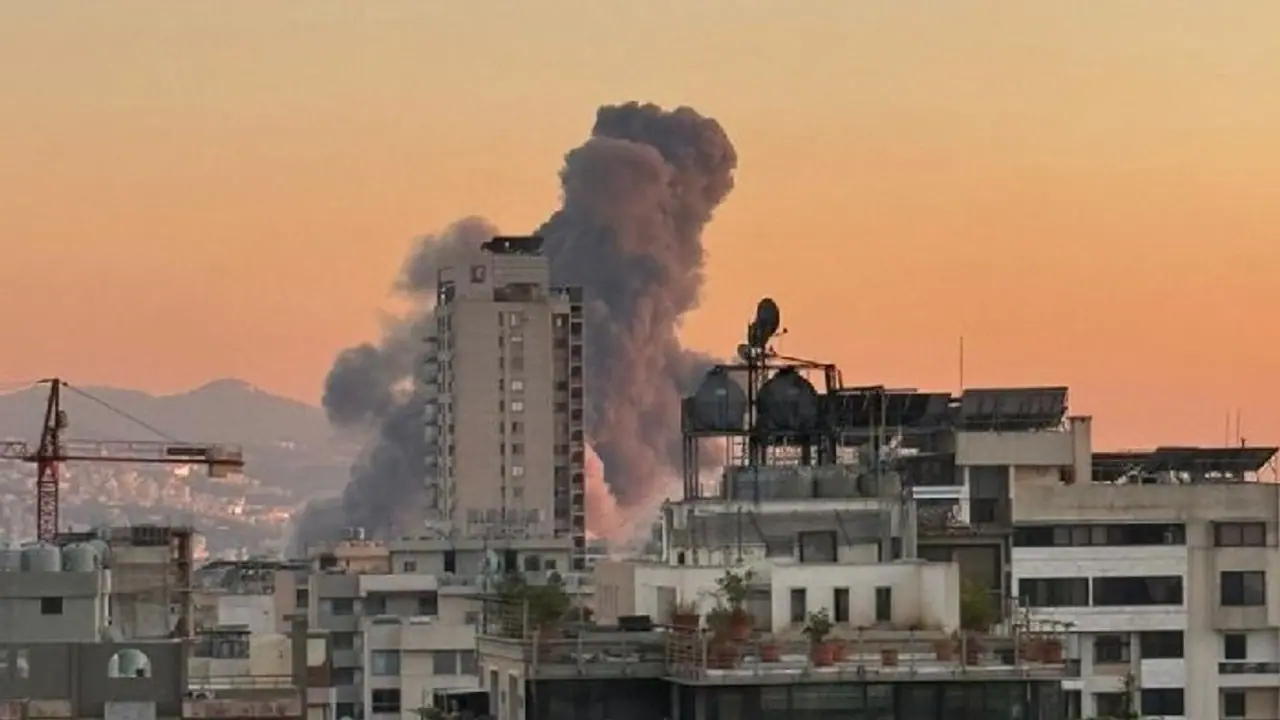The Israel Defense Forces (IDF) confirmed a airstrike targeting the central headquarters of the militant group Hezbollah, located beneath residential buildings in the heart of the Dahieh suburb in Beirut, Lebanon, on Friday.
The Israel Defense Forces (IDF) confirmed a airstrike targeting the central headquarters of the militant group Hezbollah, located beneath residential buildings in the heart of the Dahieh suburb in Beirut, Lebanon, on Friday. The IDF further stated that there has been no change in the directives of the Home Front Command, promising to provide updates on any developments through their official channels on X (formerly Twitter).

The airstrike comes amid escalating tensions between Israel and Hezbollah, which is backed by Iran. Witnesses reported multiple explosions across Beirut on Friday, with dramatic footage showing large plumes of smoke rising from various locations throughout the city. Eyewitnesses described the blasts as particularly loud, sending shockwaves through several neighborhoods.
According to reports, the IDF's latest strike was aimed at Hezbollah leader Hassan Nasrallah. According to local media, the strike is said to have involved the use of bunker-buster and 2,000-pound bombs, leading to the destruction of four residential buildings and raising urgent questions regarding Nasrallah's whereabouts.
Despite the intense military action, Al Arabiya has reported that the assassination attempt on Nasrallah has failed, with the Hezbollah leader reportedly not present during the attack.
Footage captured from the scene reveals significant smoke billowing from the area, indicating the severity of the strikes. The conflict between Israel and Hezbollah has intensified in recent weeks, leading to concerns about civilian safety and stability in the region.
Earlier today, the IDF announced a renewed wave of airstrikes targeting Hezbollah positions in southern Lebanon, although further details about the specific locations and the impact of these strikes have yet to be confirmed.
This surge in violence comes amid heightened tensions between Israel and Hezbollah, following a series of retaliatory measures and threats exchanged between the two sides. Israeli Prime Minister Benjamin Netanyahu, during a speech at the UN General Assembly earlier today, emphasized Israel's commitment to combating Hezbollah, which he accused of terrorism and unprovoked aggression against Israeli citizens. He stated, “Enough is enough. We won’t rest until our citizens can return safely to their homes.”
Netanyahu also warned that Israel is prepared to act decisively against Iranian influence in the region, stating, “There is no place in Iran that the long arm of Israel cannot reach.” His remarks underscored Israel's strategic stance amidst ongoing conflicts and its determination to thwart perceived threats from both Hezbollah and Iran.
In his speech, Netanyahu articulated a broader vision for peace, emphasizing the necessity of establishing a peace agreement with Saudi Arabia as a means to bolster security in the region. He noted that such a peace would have far-reaching benefits for both Israel and the Arab world, potentially transforming the geopolitical landscape.
However, he reiterated his position on Hamas and Hezbollah, insisting that Israel will not tolerate threats on its borders. “Hamas has got to go,” he declared, highlighting Israel’s objective of a demilitarized Gaza as part of his long-term strategy to ensure the safety of Israeli citizens.
Netanyahu's comments have drawn mixed reactions globally, particularly regarding his critique of the United Nations, which he labeled a “swamp of antisemitic bile.” He called for equal treatment of Israel within international forums, expressing frustration over what he perceives as bias against the Jewish state.
